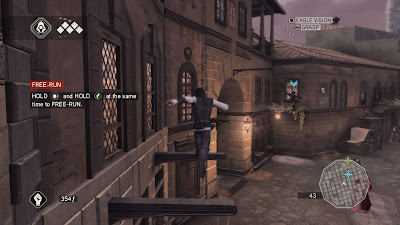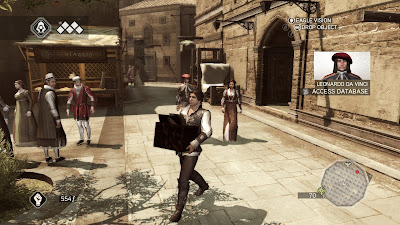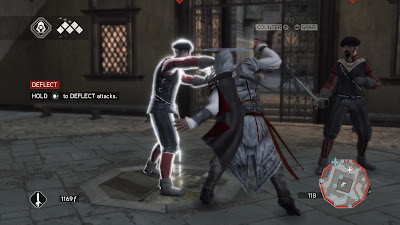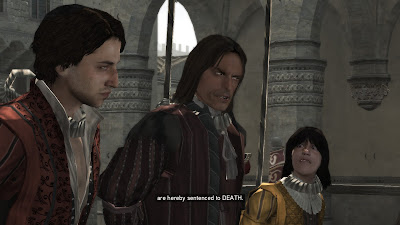 |
| Source // PlayStation |
Remember when Assassin's Creed games were good? No, that's not fair, let me rephrase it. Remember when Assassin's Creed meant something? When the overarching, convoluted conspiracies of the Templars and the Assassin's was a strange alternate history tale that was silly, but fun. Engaging.
In its heyday, I, like many other players, dove into the series head first and consumed it all. Brotherhood, if I recall correctly, was played so much that it gave my PlayStation 3 a yellow light of death, forcing me to purchase a new console (which I still have today for all of these missed games). I even read the books to see some of the stories from another perspective, and actually bothered to try and understand what was going on under the surface.
I couldn't explain it to you now, partly because it was ten years ago, but mostly because as the series grew, it lost focus, and now nothing makes any sense. It makes so little sense, even, that in the more recent games of the series, I don't even care about the modern-day story, instead thoroughly going through the alternate ancient histories so well presented for hours and hours and hours on end.
Oh... You didn't know there was a modern story? Let's get you up to speed for Assassin's Creed II then.
Fun Times
Assassin's Creed II kicks into gear with a brief recap of the events of the first game, an action-adventure set in the middle east, in the time of the crusades of the late 1100s - or so we were lead to believe when the game was first announced.
In actuality, we're using a device known as the Animus to play through/relive the genetic memories stored in the DNA of Desmond Miles, a barman who has been abducted by the Templars to aid them in their search for the Piece of Eden, an otherworldly object and source of immense power.
The idea is bonkers, but the folks wishing to bring Assassin's Creed to market have done their homework, interweaving historical fact with fascinating fiction, and throwing enough into the project to make it succeed. Assassin's Creed was a good game. Assassin's Creed II would be a great one.
Frustrations
It would be a great one on the consoles, at least. This PC port that I'm playing all these years later has support for controllers, but it's appalling. Buttons can be reassigned - if you're lucky - but I'm basically playing this game with only one face button in the right place, the pause menu on one of the sticks, the camera controls on the triggers...
It was put up with this or try and comprehend parkour using the right mouse button and the space bar. I'll stick with what I'm familiar with, even if the buttons are wonky.
Anyway, that's my little grumble out of the way. We've just witnessed the birth of a new ancestor, emerging into the Renaissance kicking and screaming - providing you press the right buttons.
Further Fun Times
There's no time to experience much more of our childhood, however, as we've got to escape from the Templars with the help of Lucy here, an insider who has finally managed to spring us out. Having spent much of our time lying down in an Animus against our will, we're not exactly a honed fighter these days, but the desperation to escape triumphs over the attempts of guards to detain us, and our Assassin's Creed II tale can take off.
With a sarcastic support crew and an Animus 2.0 complete with stolen memory core data about the life of Ezio Auditore, we're able to help the Assassin's turn the tide of their modern-day war with the Templars by once again shutting ourselves inside our memories and being someone else - only this time, we're going to be training how to be an assassin through some kind of osmosis, or 'bleeding effect', as Assassin's Creed calls it.
I know exactly where I want to take this playthrough to, but I have to point out that by the time I get there, we won't have even scratched the surface of what Assassin's Creed II has to offer players. It was said that the first game didn't have much in terms of actual gameplay, and was quite repetitive, despite allowing you to go about your missions in a variety of ways.
Assassin's Creed II was a sequel that didn't just stand on the shoulders of the first game, but gracefully swan-dived off them and proceeded to stab the nearest Templar in the neck before he knew what was going on. Assassin's Creed II is so much more than what you get up to in the first hour, but that's all I'm going to talk about today.
Boys will be boys, we're told. Lovely though our Italian surroundings may be on the Ponte Vecchio bridge, they're about to get a little bloodied by all these fists. Combat in Assassin's Creed games largely consists of you picking a target, locking your attention onto them, and pressing the attack button until they go down.
You can grab your target by the scruff of their neck and throw them around, or thrust your knee into their face if you feel like changing things up, but there is a far more effective means to dish out the damage, especially in this game: the Counter.
There are two stances you can be in, and because I can't think for the life of me what they're called right now, let's call them casual and loud. You can casually throw a punch, no problem. You can through some loud, heavy punches too, but time it right and you can counter an incoming attack with a brutal one-hit takedown, each with its own animation that depends on what weapon you have equipped or where your attacker was coming from - with Ezio smart enough to react to threats he can't see with a well-timed nudge of the analogue stick.
A lot of the historical stuff is completely optional. You can go through an Assassin's Creed title and not care one bit what actually happened at this time, in this place, but learning a little of the context that the games put themselves in can be just as rewarding as playing the games themselves.
History can be a hard sell, though, and most players will want to do what Assassin's Creed games do best: give players the freedom to clamber up practically everything in sight, and then leap off the top into a haycart below.
Parkour was all the rage in the mid-2000s, but video games didn't quite know how to approach it. Free Running, as we've seen, wasn't going to work. Mirror's Edge, criminally not on this 1001 list, was a first-person title, so you didn't really see what was going on. Assassin's Creed just got it right, and kept working and refining the system (sometimes more successfully than other times) to suit the kind of game they were telling.
Going loud (still can't remember what the stance is actually called) allows you to get primed for some sprinting, and you can hold down the feet button to parkour to your heart's content, springing up clearly designed parkour paths that take you from the floor to the rooftops in seconds.
Ezio will climb, dangle, perch, balance and leap across objects and obstacles, hopefully managing to find something to grab or land on on the other side, else you'll plummet to the floor and lose a fair bit of health. He's a lot faster going up than he is going down, and over time you'll be able to spot escape routes that you'll navigate like a cat, and your pursuers likely won't.
It has barely taken any time at all for you to see that Assassin's Creed II is so much more than Assassin's Creed ever was. The gruff, no-nonsense Altair, the hero of the first game, is replaced by a young lad out of his league, cocky, stupid, but loveable.
From his vantage point at the top of the church with his brother, he spots the window of love interest Cristina, spends the night with her, flees from her father in the morning as he shouts at the guards to kill him, escapes the guards by leaping over the rooftops and hiding in plain sight before returning to his father who just can't stay mad, because he is reminded of his own escapades in his youth. How can you not want to see where this story will take us?
It's a lengthy tutorial disguised as a story to start the game, but we learn that something is going on with our father. He seems a good guy, so there's nothing to worry about, but there's some backstory for us to dig into, and some family errands to run.
Our mother wants us to do some heavy lifting, for example, where we're introduced to the bromance of the Assassin's Creed II trilogy...
The one and only Leonardo Da Vinci will play a key role in Ezio's journey towards becoming a successful assassin. It may be quite the shoe-horning of history to get it to work, but who is complaining that this genius is crafting hidden blades and deciphering puzzles on behalf of the Assassins?
There are lots of historical figures throughout the games, some you'll have heard of, many you won't have, each with fascinating tales to tell. The series isn't just name-dropping them, but linking key events in their lives to this elaborate story of the Templar/Assassin rivalry, and we'll even get to play a part in those events as the games go on.
Paintings carried back home, we can help out our sister, whose boyfriend is cheating on her, and needs beating up. It's a simple mission, but it takes us to some wonderful architecture that I proceed to clamber up.
No other game showed off its environment like is, blocky and bland though the extremities often were. The swooping camera, the musical cue, the sense of pride you get at having scrambled up the outside of a building, and the peace you get from being the only person up here... it makes Assassin's Creed as a series stand out, even if some of the viewpoints are copied and pasted, and the puzzle of navigating your way up is often a simple one to solve. It was fun and useful.
Further Frustrations
What wasn't so fun and useful were some of the side-attractions that Assassin's Creed II brought to the table to flesh out the gameplay. Our younger brother wants us to collect black feathers, but won't tell us what for. As you can imagine, it's not a handful of feathers, but a bucketload, scattered across the entire game, and it's not the only collectable doohickey to find.
A look at my trophy data for the PS3 shows that I did this and whatever else was required to get the Platinum trophy, but there wasn't a need to do so, really, nor is there a real need to partake in races across the rooftops, or delivering mail across the city, but these activities and more are there to remind us that it's not just about assassinating folks in this game.
Further Fun Times
But it is, really, or it's on the way to getting there. Our father has tasked us with delivering more messages, but the recipients aren't everyday citizens. Something is afoot, and returning to find the males of the household arrested and imprisoned will set the wheels of Assassin's Creed II in motion.
And then there are these assholes. Yeah, I see you back there. Hindsight is great and all, but if you don't notice that this family friend is a slimy one, I don't know how you're going to fare when the story kicks into higher gears. Conspiracy, backstabbing, politics... this isn't Hitman. This is bigger than you, bigger than Ezio or Desmond.
To play Assassin's Creed is to play a small fraction of a much larger story, one that requires repeat viewings to get the most out of it, and multiple games for it to make sense - though it stopped doing that a while ago, sad to say.
You can play an Assassin's Creed game in isolation, though, especially when they are as big and crammed full of stuff to do as they are these days - I put 98.4 hours into Odyssey, for example, before calling it a day there (and I didn't bother with the last weird DLC at all) - but they just don't feel like they're designed to be played in such a way. Assassin's Creed II is part of the Ezio Trilogy, such was the success of this first outing of his, so it's best to know what you're heading into.
Umberto here has reassured us that the problem of our imprisoned family will be solved in the morning, but Ezio is about to grow up awfully quick...
And that's where I ended my first play of Assassin's Creed II in however many years, sat in a line-of-sight breaking feature to evade the guards who are out to kill me on sight for my surname. Were my family the bad guys? Silly question, clearly not. Will they be avenged? Oh, you bet.
 |
| Source // PlayStation |
 |
| Source // PlayStation |
 |
| Source // PlayStation |
 |
| Source // PlayStation |
 |
| Source // PlayStation |
 |
| Source // PlayStation |
 |
| Source // PlayStation |
 |
| Source // PlayStation |
Fond Memories
These bullshots are Assassin's Creed II at its touched up best, but they evoke plenty of memories of scrambling through the streets and over the canals of Venice, renovating the entire town of Monteriggioni, and finding and decoding messages left behind by another unfortunate abductee of the Templars which tell the tale of human history, which is most definitely not the tale you're thinking of.
All in all, Assassin's Creed II kickstarted the hype that the series would ultimately get. Some of the games since have been lacking, others have knocked it out of the park, but none have been so neatly tied up as the Ezio Trilogy.
This trilogy is the golden age of Assassin's Creed. It was on form and delivered with each and every instalment, taking an interesting idea and sprinting with it, straight up walls if it had to. It was a joy to be absorbed in this world, theorizing where the next game would take us, both in terms of where in time and place we wanted to experience, and what absurd alternate history we'd find there.
There would be stumbles along the way, and losing key figures in the development team would slowly send the series a little off the rails, but if you pick up an Assassin's Creed title, you generally had a great time, whatever it was that you got up to. I know I did.
Final Word
But to play Assassin's Creed II these days is a little weird. I can easily see how I was so interested in it, but with the benefit of hindsight, I can also see how janky some of it is, and I'm not just talking about the PC port being incapable of running in a windowed mode.
Which one Assassin's Creed title is best? For many, it can be found in Brotherhood, the sequel to Assassin's Creed II, furthering Ezio's story and developing on what worked and what didn't. For others, it's Assassin's Creed IV: Black Flag, the tale of Edward Kenway, assassin pirate of the Caribbean. The Assasins vs Templars story there was never as important as the thrill of sailing the seas, your crew getting their shanty on before rocking up and assaulting the shoreline with a broadside.
In more recent times, Unity was flawed but insanely detailed, Syndicate took us to London but in a largely forgettable story, and as mentioned, I spent an awful lot of time taking Kassandra around seemingly all of Greece in Odyssey, but at this point, I didn't feel like I was playing an Assassin's Creed game, so much as I was playing something with an excuse to put Assassin's Creed on the box.
The reason you want Assassin's Creed to be written on the box to your historical action-adventure is because of Assassin's Creed II, and what the series meant back then, which is a lot more than it means now.
Will I play more Assassin's Creed II? I might put up with awkward controls for a little while longer, yeah, but I've played it multiple times now, and have seen a great in-depth let's play in the run-up to getting back to playing it myself, so it's not like I don't know what I'm going to see and be amazed by it all over again.
No, like the series itself, Assassin's Creed II is perhaps better as a memory. There were, and for those wanting to play it, are still good times to be found here, but to relive them properly requires quite a bit of effort, going back in time to learn from the masters that came before you...
Put up your hood and dive into a pile of hay sometime. You'll not regret it.
Fun Facts
The success of the series was evident early on, with the development team tripling in size between the first two titles alone.
Assassin's Creed II, developed by Ubisoft Montréal, first released in 2009.
Versions played: PlayStation 3, 2009, via memory,
PC, 2010.
Version watched: Xbox 360, 2009, (GeopLP)























































































